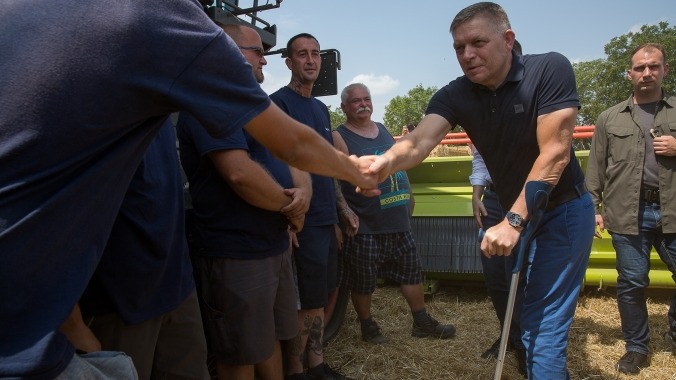Trump Wasn’t the Only Populist Leader Shot this Year
Photo by Zuzana Gogova/Getty Images
A populist leader, notorious for his bombastic and belligerent rhetoric, is shot in public by a would-be assassin. He survives, by the skin of his teeth, but what the wider consequences of this terrible event will prove to be are unclear. His deeply partisan nation, far from being drawn together in solidarity by this violence, is left more divided than ever.
This is not an article about Donald Trump.
On May 15, 2024, Robert Fico, the prime minister of Slovakia, was in Handlová, a small coal mining town, to attend a meeting. The session passed by without incident, and, when it was all said and done, Fico decided to step outside to greet a crowd of people that had assembled to show him their support. Among them was Juraj Cintula.
An unassuming man of 71 years, Cintula was no fan of the prime minister. He was, in fact, there to murder him.
Fico, having dominated Slovak politics for the previous two decades, had made plenty of enemies by this point. He became prime minister for the first time in 2006, proceeding to repeatedly fall in and out of power throughout a political career marred by scandal and vulgarity. His present term as the Slovak leader, which began in 2023, is his fourth.
The head of the ostensibly left-wing Smer party, Fico has often relied on far-right support in power, which has surely influenced the development of his decidedly strange politics. Once a member of the Communist Party of Czechoslovakia, he now advocates for a sort of left-wing nationalism when it comes to the economy, while, on social issues, he has pivoted far to the right.
The prime minister’s xenophobia is hardly subtle — he once literally declared that “Islam has no place in Slovakia” — and he viciously opposes immigration into the country. He has mocked the Slovak Roma community, has characterized gay couples who adopt children as a “perversion,” and has emerged as a prominent anti-masker in the wake of the COVID pandemic.
Fico’s government recently failed to overhaul Slovakia’s criminal system, which, had they succeeded, would have softened penalties for corruption — a crime Fico himself has been charged with — and reduced the statute of limitations for major offenses such as rape. They are also set to reshape the country’s public broadcasting service, which, critics warn, will harm media freedom by giving the government control of the nation’s TV and radio broadcasts.
Fico’s evident taste for authoritarianism, not to mention his bellicose rhetorical style, has earned him the ire of liberals all across Europe, but it is his apparent support for Vladimir Putin which has created the most angst. He has been a vocal opponent of European sanctions on Russia, while, after entering office in 2023, he halted military aid for Ukraine, Slovakia’s eastern neighbor, though this policy has since been reversed.
-

-

-

-

-

-

-

-

-

-

-

-

-

-

-

-

-

-

-

-

-

-

-

-

-

-

-

-

-

-

-

-

-

-

-

-

-

-

-

-

-

-

-

-

-

-

-

-

-

-

-

-

-

-

-

-

-

-

-

-

-

-

-

-

-

-

-

-

-

-

-

-

-

-

-

-

-

-

-

-

-

-

-

-

-

-

-

-

-

-

-

-

-

-

-

-

-

-

-

-

-

-

-

-

-

-

-

-












































































































